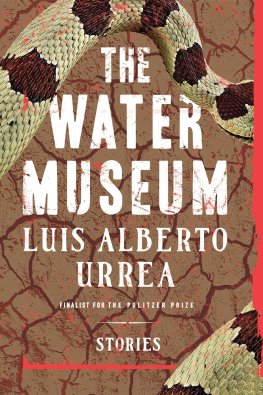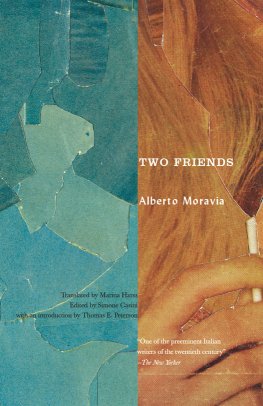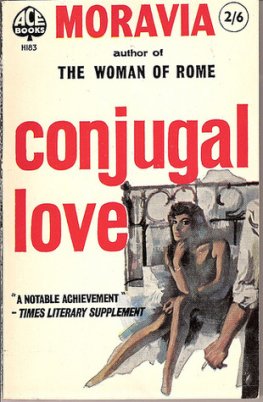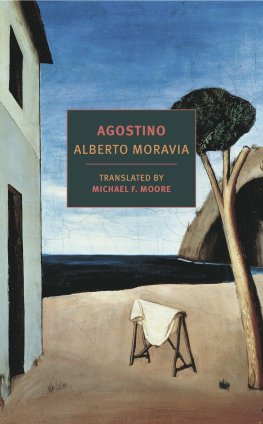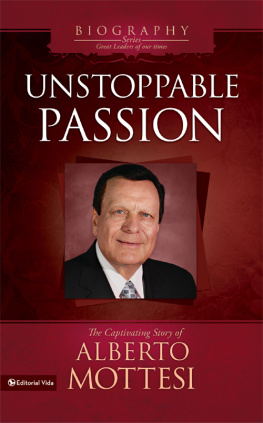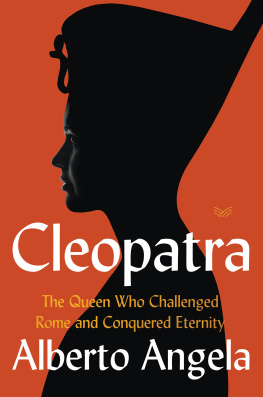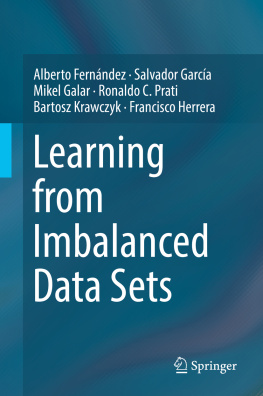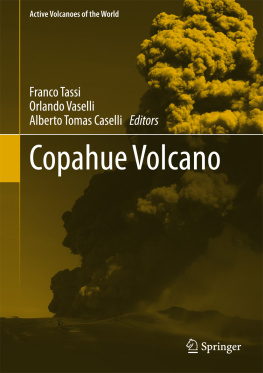Alberto Pincherle - The empty canvas by Alberto Moravia pseud. Translated by Angus Davidson.
Here you can read online Alberto Pincherle - The empty canvas by Alberto Moravia pseud. Translated by Angus Davidson. full text of the book (entire story) in english for free. Download pdf and epub, get meaning, cover and reviews about this ebook. year: 1961, publisher: Farrar, Straus and Cudahy, genre: Art. Description of the work, (preface) as well as reviews are available. Best literature library LitArk.com created for fans of good reading and offers a wide selection of genres:
Romance novel
Science fiction
Adventure
Detective
Science
History
Home and family
Prose
Art
Politics
Computer
Non-fiction
Religion
Business
Children
Humor
Choose a favorite category and find really read worthwhile books. Enjoy immersion in the world of imagination, feel the emotions of the characters or learn something new for yourself, make an fascinating discovery.

- Book:The empty canvas by Alberto Moravia pseud. Translated by Angus Davidson.
- Author:
- Publisher:Farrar, Straus and Cudahy
- Genre:
- Year:1961
- Rating:5 / 5
- Favourites:Add to favourites
- Your mark:
- 100
- 1
- 2
- 3
- 4
- 5
The empty canvas by Alberto Moravia pseud. Translated by Angus Davidson.: summary, description and annotation
We offer to read an annotation, description, summary or preface (depends on what the author of the book "The empty canvas by Alberto Moravia pseud. Translated by Angus Davidson." wrote himself). If you haven't found the necessary information about the book — write in the comments, we will try to find it.
The empty canvas by Alberto Moravia pseud. Translated by Angus Davidson. — read online for free the complete book (whole text) full work
Below is the text of the book, divided by pages. System saving the place of the last page read, allows you to conveniently read the book "The empty canvas by Alberto Moravia pseud. Translated by Angus Davidson." online for free, without having to search again every time where you left off. Put a bookmark, and you can go to the page where you finished reading at any time.
Font size:
Interval:
Bookmark:
Alberto Moravia
The Empty Canvas
Translated from the Italian by Angus Davidson
La noia first published 1961
This translation first published by Seeker & Warburg 1961 Published in Penguin Books 1965
Copyright Valentino Bompiani, 1961 Translation copyright Seeker & Warburg, 1961
Contents
Prologue
I remember perfectly well how it was that I stopped painting. One evening, after I had been for eight hours on end in my studio, painting for five or ten minutes at a time and then throwing myself down on the divan and lying there flat, staring up at the ceiling, for an hour or twoall of a sudden, as though at last, after so many feeble attempts, I had had a genuine inspiration, I stubbed out my last cigarette in an ashtray already full of dead cigarette-ends, leapt cat-like from the armchair into which I had sunk, seized hold of a small palette-knife which I sometimes used for scraping off colours and slashed repeatedly at the canvas on which I had been painting, not content until I had reduced it to ribbons. Then from a corner of the room I took a blank canvas of the same size, threw away the torn canvas and placed the new one on the easel. Immediately afterwards, however, I realized that the whole of myshall I say creative?energy had been vented completely in my furious, and fundamentally rational, gesture of destruction. I had been working on that canvas for the last two months, doggedly and without pause; slashing it to ribbons with a knife was equivalent, fundamentally, to finishing itin a negative manner, perhaps, as regards external results, which in any case had little interest for me, but positively, in relation to my own inspiration. In point of fact, my destruction of the canvas meant that I had reached the conclusion of a long discourse which I had been holding with myself for goodness knows how long. It meant that I had at last planted my foot on solid ground. And so the empty canvas that now stood on the easel was not just an ordinary canvas which had not yet been used; it was a particular canvas that I had placed on the easel at the termination of a long job of work. In effect, I thought, seeking to console myself against the sense of catastrophe that was throttling me, this canvas, similar in appearance to so many other canvases but for me fraught with meaning and consequence, could be the starting-point from which I could now begin all over again, in complete freedom; just as if those ten years of painting had not gone by and I myself were still twenty-six, as I was when I had left my mother's house and had gone to live in the studio in Via Margutta, in order to devote myself, in complete leisure, to painting. However, on the other hand, it might well bein fact, it was highly probablethat the empty canvas now flaunting itself on the easel was the outward sign of a development no less intimate and no less necessary but entirely negative, a development which might lead me, by imperceptible stages, to complete impotence. And that this second hypothesis might well be the true one appeared to be borne out by the fact that slowly but surely boredom had come to be the companion of my work during the last six months, until finally it had brought it to a full stop on that afternoon when I slashed my canvas to tatters; it was rather like a deposit of lime in a spring which, in the end, blocks the pipes and brings the flow of water to a complete standstill.
I think it may perhaps be opportune, at this point, for me to say a few words on the subject of boredom, a feeling which I shall have reason to mention frequently in the course of these pages. Now, however far back into the years I probe in memory, I recall having suffered always from boredom. But it is important to understand what I mean by this word. For many people boredom is the opposite of amusement; and amusement means distraction, forgetfulness. For me, on the contrary, boredom is not the opposite of amusement; I might even go so far as to say that in certain of its aspects it actually resembles amusement inasmuch as it in fact gives rise to distraction and forgetfulness, even if of a very special type. Boredom, to me, consists, to be precise, in a kind of insufficiency or inadequacy or lack of reality. Reality, when I am bored, has always had the same disconcerting effect upon me as (to make use of a metaphor) a too short blanket has upon a sleeping man, on a winter night: he pulls it down over his feet and his chest gets cold, then he pulls it up on to his chest and his feet get cold; and so he never succeeds in falling properly asleep. Or again (to make use of a different comparison) my boredom resembles a repeated and mysterious interruption of the electric current inside a house: at one moment everything is clear and obvioushere are armchairs, over there are sofas, beyond are cupboards, side-tables, pictures, curtains, carpets, windows, doors; a moment later there is nothing but darkness and an empty void. Yet again (a third comparison) my boredom might be described as a malady affecting external objects and consisting of a withering process, of an almost instantaneous loss of vitalityjust as though one saw a flower change in a few seconds, by a series of extremely rapid transformations, from a bud to decay and dust.
The feeling of boredom originates, for me, in a sense of the absurdity of a reality which, as I have said, is insufficient, or anyhow unable, to convince me of its own effective existence. It may happen, for instance, that I am looking with some degree of attentiveness at a tumbler. As long as I say to myself that this tumbler is a glass or metal vessel made for the purpose of putting liquid into it and carrying it to one's lips without upsetting it, as long, that is, as I am able to represent the tumbler to myself in a convincing manner, so long shall I feel that I have some sort of a relationship with it, a relationship close enough to make me believe in its existence and also, on a subordinate level, in my own. But once the tumbler withers away and loses its vitality in the manner I have described, or, in other words, reveals itself to me as something foreign, something with which I have no relationship, once it appears to me as an absurd objectthen from that very absurdity springs boredom, which when all is said and done (let it now be stated) is simply a kind of incommunicability and the incapacity to disengage oneself from it. But this boredom, in turn, would not cause me to suffer so much if I did not know that, although I myself have no relationship with the tumbler, such a relationship might perhaps be possible: that is, because the tumbler exists in some unknown paradise in which objects do not for one moment cease to be objects. For me, therefore, boredom is not only the inability to escape from myself but is also the consciousness that, theoretically, I might be able to disengage myself from it thanks to a miracle of some sort.
I mentioned that I have always been bored; let me add that it is only in fairly recent times that I have succeeded in understanding, with a sufficient measure of clarity, what boredom really is. During childhood, and later too, during adolescence and first youth, I suffered from boredom without explaining it to myself, like someone who suffers from continual headaches but never makes up his mind to consult a doctor. Especially when I was a child, boredom used to assume forms that were entirely obscure both to myself and to other people, forms which I was unable to explain and which others, not infrequently my mother, attributed to upsets in my health or other similar causesjust as the crossness of tiny babies is often attributed to their cutting teeth. It would happen, during those years, that I suddenly stopped playing and remained for hours on end motionless, as though in astonishment: in reality overcome by the uneasiness inspired in me by what I have called the withering of objects, or in other words the obscure consciousness that between myself and external things there was no relationship. If, at such times, my mother came into the room and, seeing me dumb and inert and pale with distress, asked what was wrong with me, I answered invariably: 'I'm bored' thus explaining a vague and indefinite state of mind in a single word of clear, narrow significance. Then my mother, taking my statement seriously, would lean down and kiss me and then promise to take me to the cinema that afternoon, or suggest some kind of amusement which, as I already knew perfectly well, was neither the opposite thing to boredom nor yet its remedy. And I, though pretending to welcome her suggestion with delight, could not prevent myself from having the same feeling of boredomthe boredom that my mother claimed to be driving awayat the touch of her lips on my forehead, at the placing of her arms round my shoulders, as well as at the thought of the cinema that she held like a dazzling mirage in front of my eyes. Neither with her lips, nor with her arms, nor yet with the cinema had I, in fact, any sort of relationship at that moment. But how could I explain to my mother that the feeling of boredom from which I was suffering could not be alleviated in any way? I have already observed that boredom consists chiefly of incommunicability. And now, being unable to communicate with my mother, from whom I was cut off as I was from every other kind of external object, I was in a way forced to accept the misunderstanding and lie to her.
Next pageFont size:
Interval:
Bookmark:
Similar books «The empty canvas by Alberto Moravia pseud. Translated by Angus Davidson.»
Look at similar books to The empty canvas by Alberto Moravia pseud. Translated by Angus Davidson.. We have selected literature similar in name and meaning in the hope of providing readers with more options to find new, interesting, not yet read works.
Discussion, reviews of the book The empty canvas by Alberto Moravia pseud. Translated by Angus Davidson. and just readers' own opinions. Leave your comments, write what you think about the work, its meaning or the main characters. Specify what exactly you liked and what you didn't like, and why you think so.

